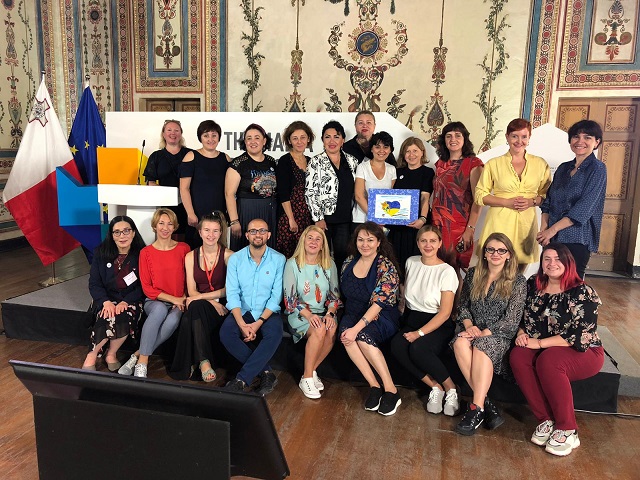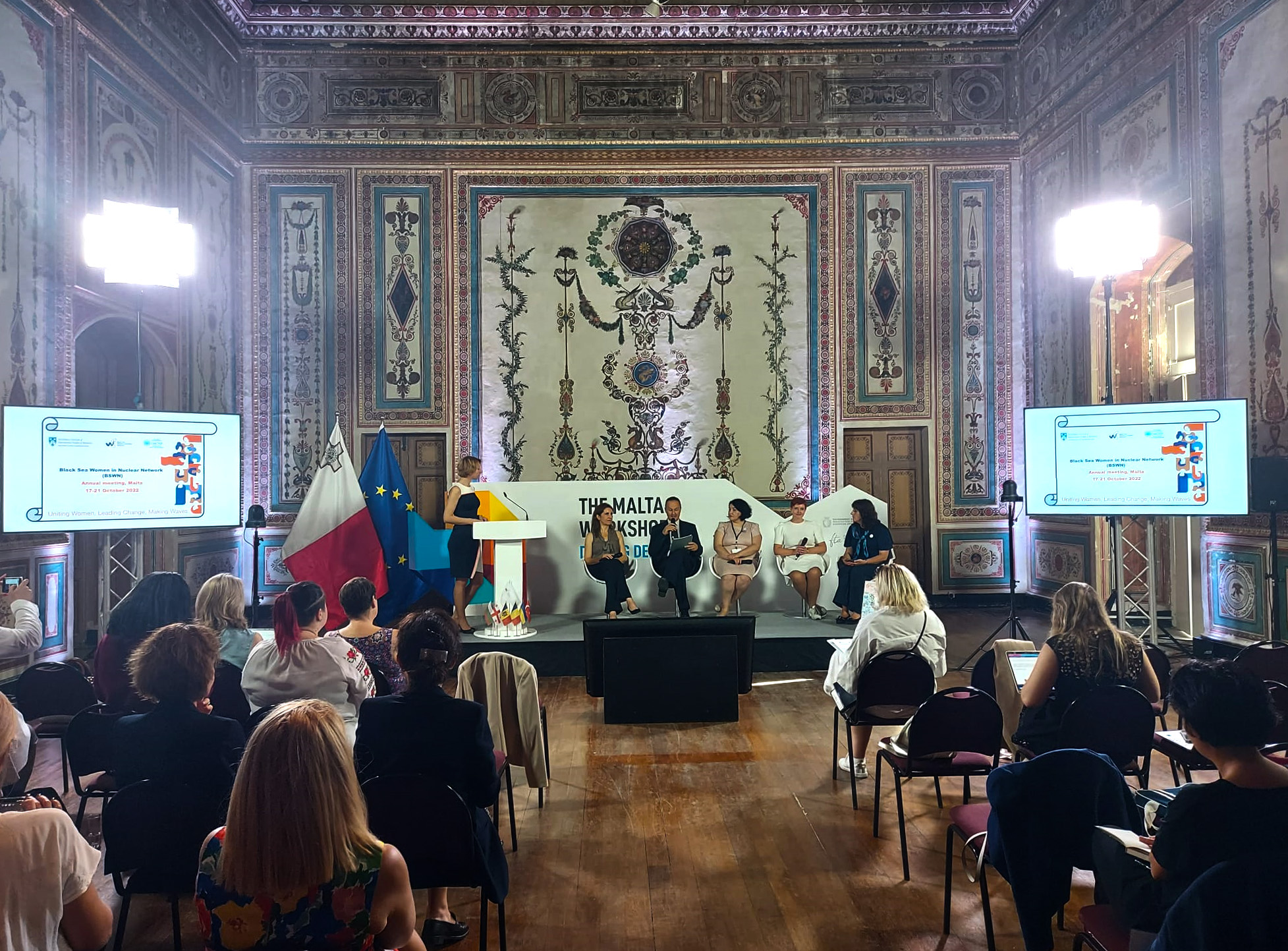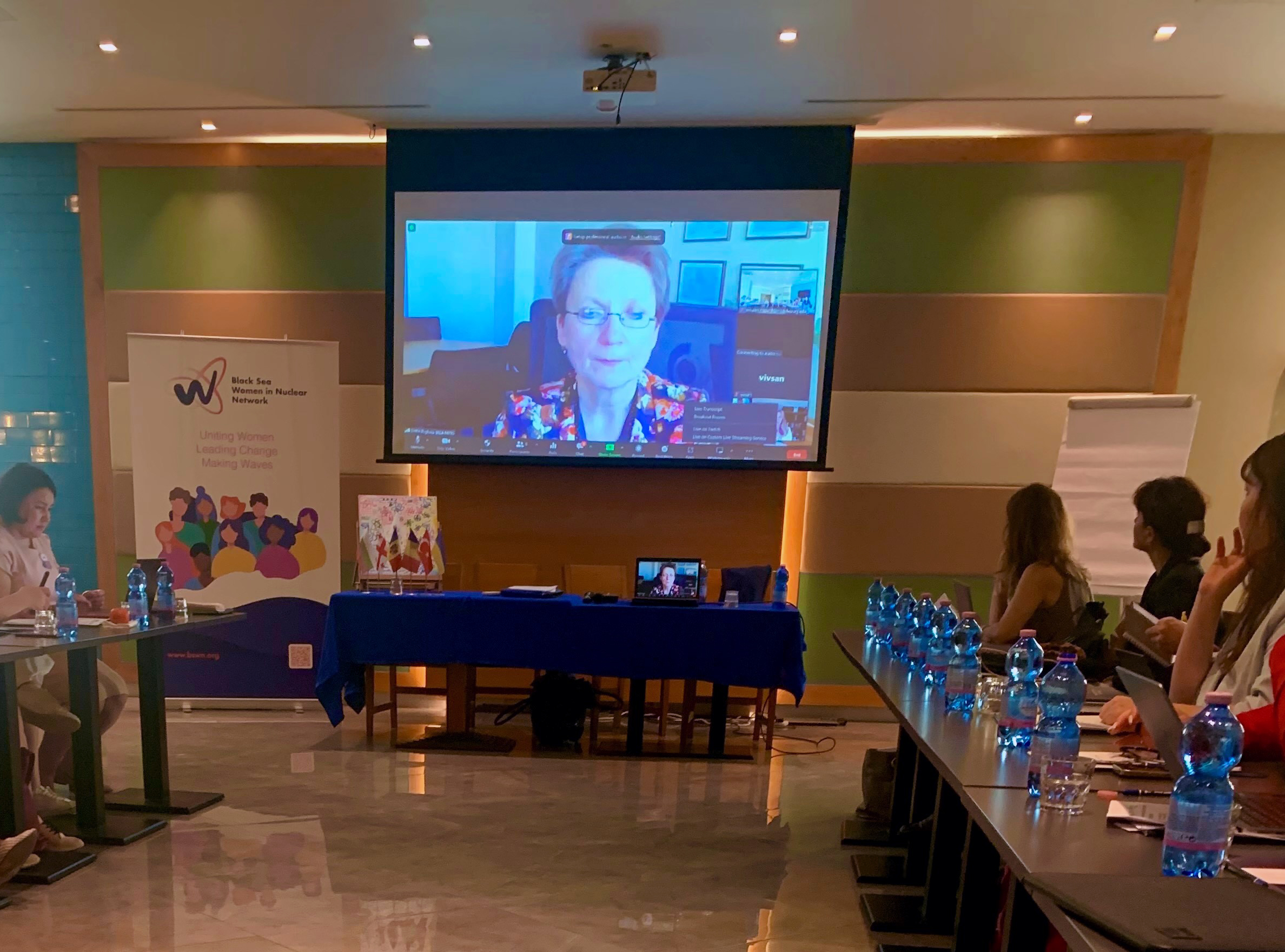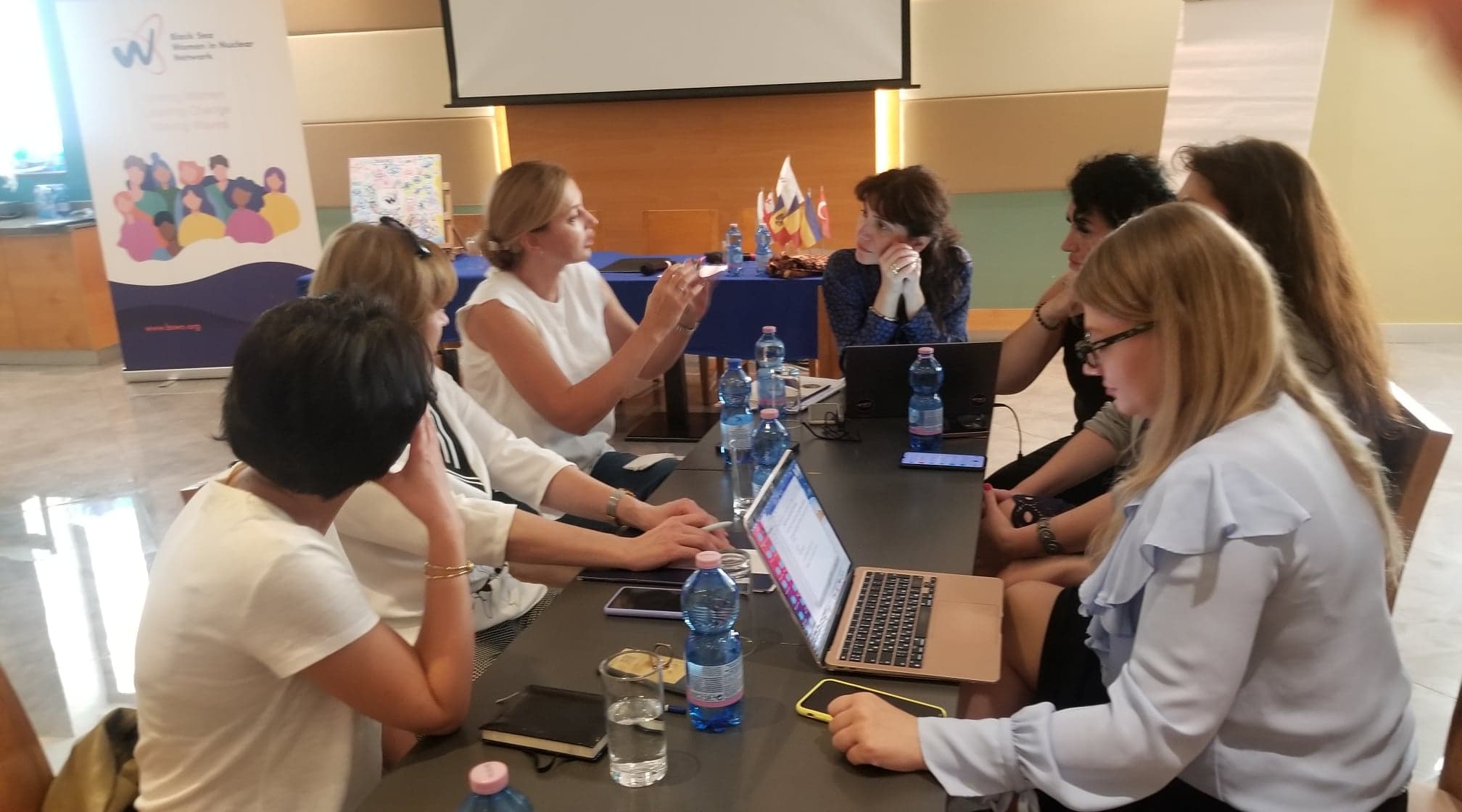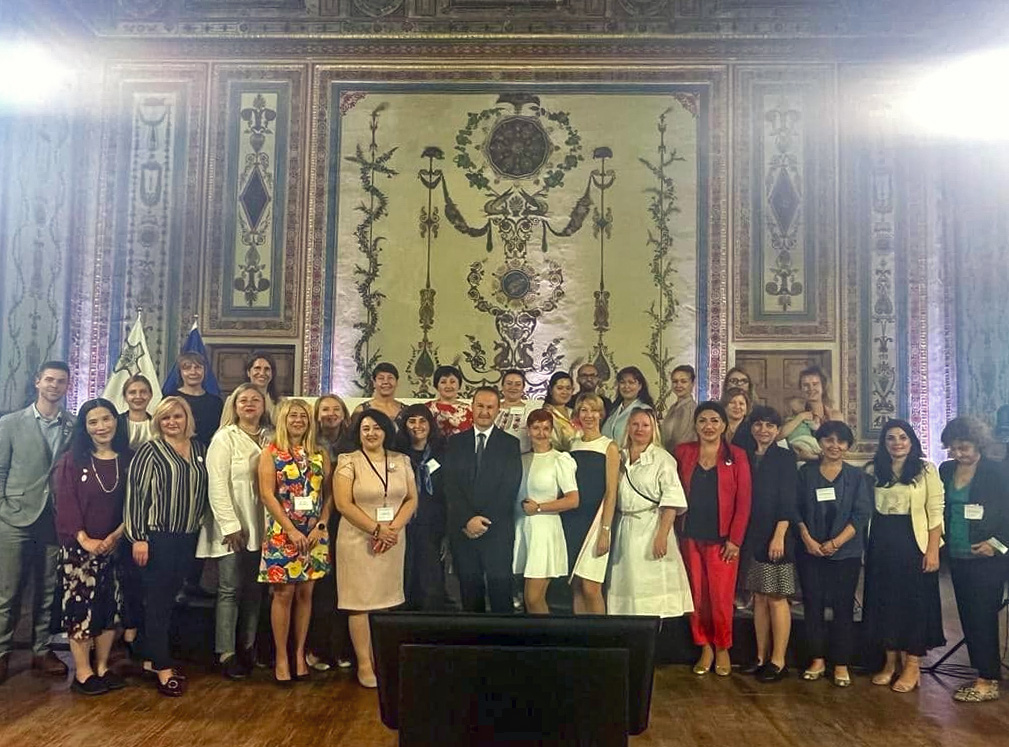November 18, 2022
Margarita Kalinina-Pohl, Adeline du Crest, Valeriia Gergiieva,[*] Kaitlin Emmons
On October 18-21, 2022, the Black Sea Women in Nuclear Network (BSWN), convened its first annual meeting in Valetta, Malta to celebrate the first successful year since its creation. The BSWN was inaugurated by the James Martin Center for Nonproliferation Studies (CNS) in partnership with the Los Alamos National Laboratory in 2021.
Consisting of over 50 members from Bulgaria, Georgia, Moldova, Romania, Türkiye, Ukraine, and other countries, the mission of BWSN is to connect, support, and empower women in nuclear fields. BSWN serves as a platform for professionals to promote gender equity and increase women’s leadership roles, as well as offer professional exchanges, mentoring, and training opportunities. BSWN sponsors include the U.S. DOE NNSA and the Swedish Radiation Safety Authority.
The first BSWN annual meeting was organized by CNS in partnership with the Odesa Center for Nonproliferation (OdCNP). Originally based in Odesa, Ukraine, the OdCNP has temporarily relocated to Malta due to the Russian invasion. The OdCNP is headed and operated by former CNS visiting fellows Polina Sinovets (VF’06), Iryna Maksymenko, and Valeriia Gergiieva (VF’19). The OdCNP secured support for the BSWN meeting from the Ministry for Foreign and European Affairs and Trade of Malta and the University of Malta. The Foreign Ministry generously provided the historic Gran Salon venue at the National Museum of Archeology and technical support for daily morning sessions held there under the umbrella of the Malta Workshops: Delving Deeper.
Participants
The meeting in Malta gathered 35 regional and international participants from Bulgaria, Georgia, Moldova, Romania, Türkiye, Ukraine, Austria, Belgium, United Kingdom, and United States. Additional participants from Austria, Canada, Serbia, Tajikistan, Ukraine, and United States joined online. Kyrgyz and Tajik representatives participated as observers. The organizers especially welcomed a delegation of women who continue living and working in war-torn Ukraine and who arrived from Slavutych, Bucha, and Kyiv.
Officials from national governments such as the Ministry of Foreign Affairs of Georgia, the Ministry of Energy of Ukraine, and the Ministry of Natural Resources of Kyrgyzstan were in attendance as well as representatives from nuclear regulatory bodies of Georgia and Moldova, nuclear industry from Romania and Ukraine, including the Chornobyl Nuclear Power Plant (NPP) and Cernavoda NPP, academic institutions from Bulgaria, Türkiye and Ukraine, and research centers from Georgia and Ukraine. International participants included governmental officials and experts from Canada, Malta, and United States, high-level representatives from the International Atomic Energy Agency, the World Institute for Nuclear Security, and U.S. nongovernmental organizations such as the Nuclear Threat Initiative (NTI), the Stimson Center, and United Kingdom’s King’s College London (KLC).
For more information, please see a full list of participants.
Objectives
The meeting’s objectives were to share best practices, inform about international initiatives aimed at promoting diversity, equity, and inclusion (DEI) in nuclear fields, provide expert assessment of current challenges to nuclear security and nonproliferation in the Black Sea region, to discuss the network’s achievements in the past year, and develop a roadmap for its sustainable future.
Opening Day
The opening of the BSWN annual meeting, hosted by Iryna Maksymenko from OdCNP, started with remarks by Neville Aquilina, Director General for Global Issues, International Development and Economic Affairs, Ministry for Foreign and European Affairs and Trade of Malta. Director General Aquilina emphasized his Ministry’s commitment to provide opportunities for the representation of women in all decision-making processes regarding disarmament, nonproliferation, and arms control. His speech was followed by opening remarks from BSWN leaders and organizers, including Nataliia Klos, BSWN coordinator, Margarita Kalinina-Pohl, CNS, Olga Martin, LANL, and Polina Sinovets, OdCNP. They spoke about the crucial role of women in nuclear fields and reflected on the progress the network has made since its inception. As Olga Martin summarized: “in diversity, there is a strength and beauty. We are here to strengthen the network and women in nuclear.”
The meeting’s agenda continued with a BSWN progress report delivered by Nataliia Klos where she highlighted the network’s achievements and activities of the past 10 months. Notable accomplishments included defining the BSWN mission, designing its logo, creating a website, preparing BSWN promotional materials, conducting joint webinars with the Women in International Security and King’s College London, preparing two statements on regional and global nuclear security and safety risks in light of Russia’s military aggression against Ukraine, organizing a BSWN booth at the IAEA’s International Conference on Safety and Security of Radioactive Sources, among others.
In the afternoon, the group welcomed another prominent speaker – Elena Buglova, Director of the Division of Nuclear Security, Department of Nuclear Safety and Security, International Atomic Energy Agency, who joined the meeting virtually to greet BSWN members. Bulgova noted that she was happy to see how the network has evolved since its virtual inauguration event in December 2021, where she was a keynote speaker, and congratulated the network on its first successful year. Viviana Sandberg from the Swedish Radiation Safety Authority and Jennie Gromoll from the U.S. State Department also delivered virtual remarks and commended the network on its accomplishments.
The remainder of the first day of the meeting was dedicated to national and international initiatives promoting women in nuclear fields. A panel dedicated to these initiatives was moderated by Ali Alkis and included presentations by Olga Martin, LANL, Alberta Borg, Ministry for Foreign and European Affairs and Trade of Malta, Jack Brosnan, NTI, and Gabi Voigt, Radiation Environment Management. The program also included a discussion with gender champions in nuclear policy Elena Sokova, Executive Director, Vienna Center for Disarmament and Nonproliferation (VCDNP); Lars van Dassen, Executive Director, World Institute for Nuclear Security; and Rick Cupitt, Senior Fellow and Director, Partnerships in Proliferation Prevention, Stimson Center. A session on best practices in advancing and supporting women in nuclear fields also took place, featuring presentations by Olga Martin, Elena Sokova, Margarita Kalinina-Pohl, Zenobia Homan, Center for Science and Security Studies, King’s College London, Ekaterina Bogomilova, University of National and World Economy, and Kathleen Heppell-Masys, Canadian Nuclear Safety Commission. BSWN member Marina Diabetic from Vinca Institute of Nuclear Sciences at the University of Belgrade in Serbia, joined the session virtually and shared her experience as the first recipient of the IAEA’s Marie Sklodowska-Curie Fellowship from Eastern Europe.
Day Two: Ukraine, DEI, and Nuclear Safety and Security
The second day started with a regional expert panel on the topic “The Impact of War in Ukraine on Regional Nuclear Security and Nonproliferation Regime” as part of the BSWN Black Sea Experts NucTalk series. Valeriia Gergiieva, OdCNP, moderated the panel which included Polina Sinovets, OdCNP, Tamara Pataria, Civil Council on Defense and Security, Ali Alkis, Hacettepe University, and Nataliia Melnyk, Ukrainian Civil Society Hub. The experts provided their own assessments of how Russia’s military aggression in Ukraine challenged the nuclear world order and agreed that it is crucial for Black Sea countries to cooperate and support each other, especially during emerging energy crises.
The program continued with an expanded session moderated by Hanna Shepel from Igor Sikorsky Kyiv Polytechnic Institute on tools and programs to support diversity, equity, and inclusion (DEI). The session featured a self-assessment, evaluation and action plan tool on advancing DEI in nuclear security that was designed by WINS and presented to network members by Viviana Moreno. Other panelists presented their work in DEI, such as Project New Generation for Diversity and Pluralism (Shorena Lortkipanidze, CCDC), Youth Engagement: Young Girls and Women in Nonproliferation (Masako Toki, CNS), and Self-Assessment of Gender Equality in Nuclear Security: Example of Ukraine (Nataliia Klos).
The day concluded with a session addressing nuclear safety and security concerns of nuclear facilities. This session was moderated by Svitlana Kulchytska from Ukraine and featured two speakers, Valentyna Odynytsia, Chornobyl Nuclear Power Plant (ChNPP), and Miles Pomper, CNS. Valentyna provided a poignant eyewitness account of the occupation of the ChNPP by Russian troops which lasted for 38 days. She also shared hardships that people living in the ChNPP satellite town of Slavutych experienced with shortages of power, supplies, and food. Valentyna addressed consequences of the ChNNP armed seizure, including significant property damage and vandalism, worsening of the radiation situation, and suspension of all essential work, as well as physical and psychological damages to personnel. Miles spoke about the future of small modular reactors in the Black Sea region as a possible solution to countries’ dependence on Russian nuclear energy exports.
Day Three: The Future of the Network
Most of the third day of the meeting was dedicated to discussions around the future of the network and its sustainability, including communication strategies outlined by Iryna Cherednichenko, founder of the Eco Generation, Ukraine. Madalina Stefanic, Cernavoda NPP, Romania, presented a comprehensive business plan for the BSWN mentoring program. Margarita Kalinina-Pohl and Nataliia Klos led a conversation on how to utilize social media as an effective tool to promote and increase the network’s visibility. Shorena Lortkipanidze moderated a group discussion on how to expand the network and attract new members. In the end, the network elected BSWN country points of contact representing each participating country. The afternoon was dedicated to break out discussions by working groups which were tasked to come up with action plans for 2023. The day concluded with working group leaders presenting their action plans.
Last Day: Fundraising, Action Plans, and an INSJ Special Issue
The last day started with a discussion on fundraising strategies facilitated by Margarita Kalinina-Pohl and a writing workshop led by Miles Pomper. In the afternoon, the BSWN Coordinator Nataliia Klos delivered a meeting report that reflected on key take-aways from the week-long discussions and included the action plans developed by each working group. The afternoon program also included virtual guest appearances by affiliates of the International Nuclear Security Journal (INSJ), Ashley Humphrey and Kathleen Doty. Ashley and Kathleen briefed the group on a special INSJ issue dedicated to women in nuclear security and encouraged BSWM members to submit abstracts for possible inclusion in the forthcoming issue.
A Complete Success
The BSWN first annual meeting was a complete success due to the commitment and dedication of its leadership and members. This meeting created a platform and a welcoming environment providing support and camaraderie for all participants. The first annual BSWN gathering produced tangible results with specific outcomes and actions. The participants developed strategies and an action plan to continue implementing BSWN mission and activities.
The organizers are grateful to their sponsors, U.S. DOE NNSA and the Swedish Radiation Safety Authority, for supporting this event and overall BSWN activities.
Participant Testimonials
The report concludes with some testimonials by BSWN annual meeting participants reflecting on their experience at this event (original grammar and style are preserved).
“Such meetings are the best tool for building up the community, properly engage in networking and sharing concerns as well as experience corresponding to the declared milestone of achieving the common good of supporting women in the nuclear sector”
—participant from Georgia
“In general, I would like to say that participating in such a meeting and see and listen a person who is directly related to the topic can become an impetus in the minds of many women and the young generation who would like professional development in the field of nonproliferation, disarmament and global security, as well as the specifics of their situation and the main problems they face in their professional path”
—participant from Kyrgyzstan
“I believe that this event helped the participants to get to know each other better and reveal their strengths, to generate many ideas and initiatives, taking into account the difficult times for Ukraine and the world as a whole. It is great to see support among respected, professional members and partners of the network, who strongly support women nuclear professionals and accumulate efforts for the future of nuclear safety. Special thanks to BSWN for supporting our #Mriyu and Ukrainian children”
—participant from Ukraine
“The Black Sea Women in Nuclear Network’s inaugural annual conference was extremely timely, and one of the most inspiring events I have ever joined. It is hard to pick one word to eloquently illustrate this amazing group of women from the Black Sea Region, but if I have to pick one I would say its Solidarity. This one-week conference was full of precious moments with very valuable and academically stimulating discussions in many ways. The potential positive impact that this group can make on nuclear security, nonproliferation, disarmament and more broadly, peace and security is enormous. I was particularly moved by the strength and resilience of participants from Ukraine who have been still going through unfathomable challenges. Listening to nuclear experts from Chornobyl who went through extremely difficult situation brought visceral experience to all the participants. As many participants mentioned, “sisterhood” among these women is rock-solid”
—participant from US
“For me, the participation in the Annual Meeting offers: an opportunity to share the professional experience in the nuclear/radiological field, the difficulties encountered and the search for possible ways to solve them; an attempt to create a way to implement new ideas by involving as many professional women as possible from the Black Sea Region; a possibility to discover a different life and culture, this year was in an extraordinarily beautiful country like Malta”
—participant from Moldova
“BSWN is only at the beginning of its path, but already I see a team of tireless organizers, professional experts who will give their experience and time to maintain the safety of the nuclear sector. The BSWN meeting became an opportunity for me to share the experience of the Chornobyl nuclear power plant during and after the occupation, the threats to nuclear safety and security that arose in connection with this. I think it was useful for all participants to draw conclusions and be ready for new modern challenges. We highly appreciate official BSWN statements on ongoing nuclear security risks created by the military aggression against Ukraine. Undoubtedly, the involvement of women in equal work in the sector is an issue on which the Ukrainian nuclear industry must work hard. BSWN provides training, support, tools and techniques to do so”
—participant from Ukraine
“The BSWN meeting in Malta was an exceptional and emotional event: after Corona lockdown and the Russian aggression to Ukraine the first in person meeting of these incredible professional women! Congratulations for the efforts to bring also participants from bombarded Ukraine to Malta”
—participant from Austria
[*] Adeline du Crest is a current MANPTS student at MIIS; Valeriia Gergiieva is a former CNS visiting fellow (Fall ’19) and a researcher at OdCNP

